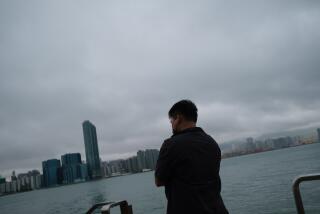As British Leave, Hong Kong Leaps Into the Unknown
- Share via
Monday at midnight, the Union Jack will be lowered for the last time over Hong Kong, marking the end of the colonial era in China. The British crown colony once again will be sovereign Chinese territory, after more than 150 years of British rule and more than a century after the gunboat diplomacy of Western nations, including the United States, forced open China’s ports to foreign trade. That book is being closed. China will be almost whole again.
How will Hong Kong fare under Beijing? Despite promises of respect for existing practices, early indications are not positive. A Beijing-appointed legislature already has voted to limit political protests, feeding fears that Beijing won’t honor its stated “one country, two systems” policy.
But more than politics is involved. Cultural pride, for instance. Few Chinese on the mainland or overseas are sorry to see the British leave. Their presence has always been a source of national humiliation. Hong Kong island fell into British hands after China was defeated in the Opium Wars of the 1830s and 1840s. Hong Kong was conquered by Japan in World War II and Britain reclaimed control in 1945, but the signs were already clear in Indochina, Indonesia and elsewhere in Asia that the colonial era was nearing an end. Now all of the former Chinese empire and its shoreline islands, except Taiwan, will be under a single flag again.
The Chinese peoples have been scattered across the world by war, politics and the quest for a better life, but they continue to hold much in common. From California immigrants to Hong Kong’s Martin Lee, a determined democrat, all Chinese share pride in their heritage--and they heavily support the notion of a united China. Even the Taiwanese yearn for one China, though, of course, under a different system. A recent Times Poll found that nearly half of the ethnic Chinese who call Southern California home believe the best future for Hong Kong lies with China. In a Hong Kong poll, a majority said Hong Kong should rejoin China. As it was put by Tung Chee-hwa, who will rule in Hong Kong for Beijing’s Communist hierarchy: “We are proud to be Chinese. It is time to be masters of our own house.”
But Beijing may energize nationalist sentiments for all the wrong reasons. While it is true the British grabbed Hong Kong by force, they are leaving behind a commendable legacy, the rule of law and respect for its institutions. Hong Kong has flourished economically under British rule, thanks in no small part to the enormous entrepreneurial talents of its people. Now Hong Kong will have a new master, one that has consistently guarded its monopoly on power and shown intolerance toward dissenters. Hong Kongers will have to adjust to a new way of life. But no less, Beijing will have to adjust to a new way to rule or risk the collapse of one of Asia’s great success stories.
More to Read
Sign up for Essential California
The most important California stories and recommendations in your inbox every morning.
You may occasionally receive promotional content from the Los Angeles Times.













